British thriller writer Alison Morton, lets off steam about her frustration with indie authors with the wrong attitude to self-publishing: a sense of entitlement.
You’re not. Entitled, I mean. To anything. Well, not in the book world.
I’m going to get into severe and profound trouble in writing this, but calm little soul that I am, I’ve reached that point of explosion. I’m fed up with attitude, specifically bad attitude.
Where I'm Coming From
I’m a moderately successful indie author with four books (so far) out in print and ebook which have been fortunate to have gathered some reader fans, lovely reviews and credible awards. I talk shop with fellow writers in my genres – historical (especially Roman), romance and thriller – and with writers mainstream, indie and hybrid as well as publishers and agents. While I love being indie, but I’m not so snooty that I wouldn’t consider a Big 5 offer. (It would have to be seriously significant, though. 😉 )
You’ve gathered by now I’m ecumenical. I’m passionate about indie education, quality, standards and ethics. Serious indies have their work peer reviewed, beta read, edited, and commission professional covers, interior design, formatting. Some talented authors commit time to learning how to do this themselves, but only a proportion reach a professional level. And then there’s the marketing…
So career-minded indies don’t sit on their hands. They also research their area, attend professional development classes, cultivate persistence and stamina, and network the Hades out of themselves. They should be proud of themselves; I know I am.
But that doesn’t make them entitled.
‘We demand a hearing.’, ‘It’s unfair.’, ‘Why don’t you stock my book?’, ‘Why aren’t I on the panel?’, ‘Why won’t you buy my book?, ‘I’m entitled to a chance.’
Perhaps I’ve been guilty of some of these, hopefully not the last. On a personal note, I’ve been door-stepped in bookshops by inexpert indies. One even followed me round Waterstones demanding I should buy his book ‘in solidarity’. Bleating and whinging doesn’t sound nice to people you’re trying to impress.
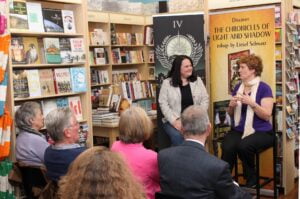
Alison Morton does a double-act with steampunk author Liesel Schwarz in Rossiters Bookshop, Ross-on-Wye
Indies have had to make extra efforts to convince readers, organisations, shops and event organisers that they are worth listening to. And we’ve had to be nimble on our feet in making and seizing marketing opportunities, so much so that mainstream publishers have given us the ultimate flattery of copying our techniques. But innovation and quick-wittedness don’t belong exclusively to us.
Misplaced Entitlement in the Trade-published Sector
Perhaps we’ve reached the stage where we *are* being heard. But now I’m hearing disquieting mutterings from friends across the writing and publishing spectrum. Some mainstream authors feel pushed out by indies taking over by sheer force of numbers, others consider indies haven’t trodden the long and hard route via multiple rejection to agent then publisher that they, the traditionally published have. That’s a whole other discussion, but reflects another kind of ‘entitlement’.
All routes are hard; writing and publishing isn’t for cissies. And nobody owes you anything, however wonderful you think your book (even mine!) is or how it’s published.
Personally, I’ve never accepted that I’m supposed to have a different status from any other writer whose books are commercially available. These days, I’m more interested in discussing Roman ball-bearings with Conn Iggulden or Roman detective Falco’s antics with Lindsey Davis than proclaiming ‘the cause’. I was very proud to chair the panel on ’The Brass Tacks of Self-Publishing’ at the Historical Novel Society conference in Denver this summer, but equally pleased to have co-led a workshop on social media for authors at the 2014 HNS conference, participated on a crime panel at Charroux Litfest and to be talking about historical research at a ChipLitFest writing day in November.
The Real Challenge to All Authors
We have arrived; the indie revolution has happened. But let’s leave the fierce, sometimes savage, war cries behind and mature into an established sector of publishing. Let’s be dignified and assured in our behaviour as well as writing great books.
Our ‘competition’ is the non-reader and other leisure activities that seduce our potential readers, not colleagues published differently.
Oh, and you still won’t be entitled to anything.
OVER TO YOU Please join the conversation via the comments box – it's going to be lively!
#Authors - ditch your sense of entitlement! says this spirited #opinion post by @alison_morton Share on X

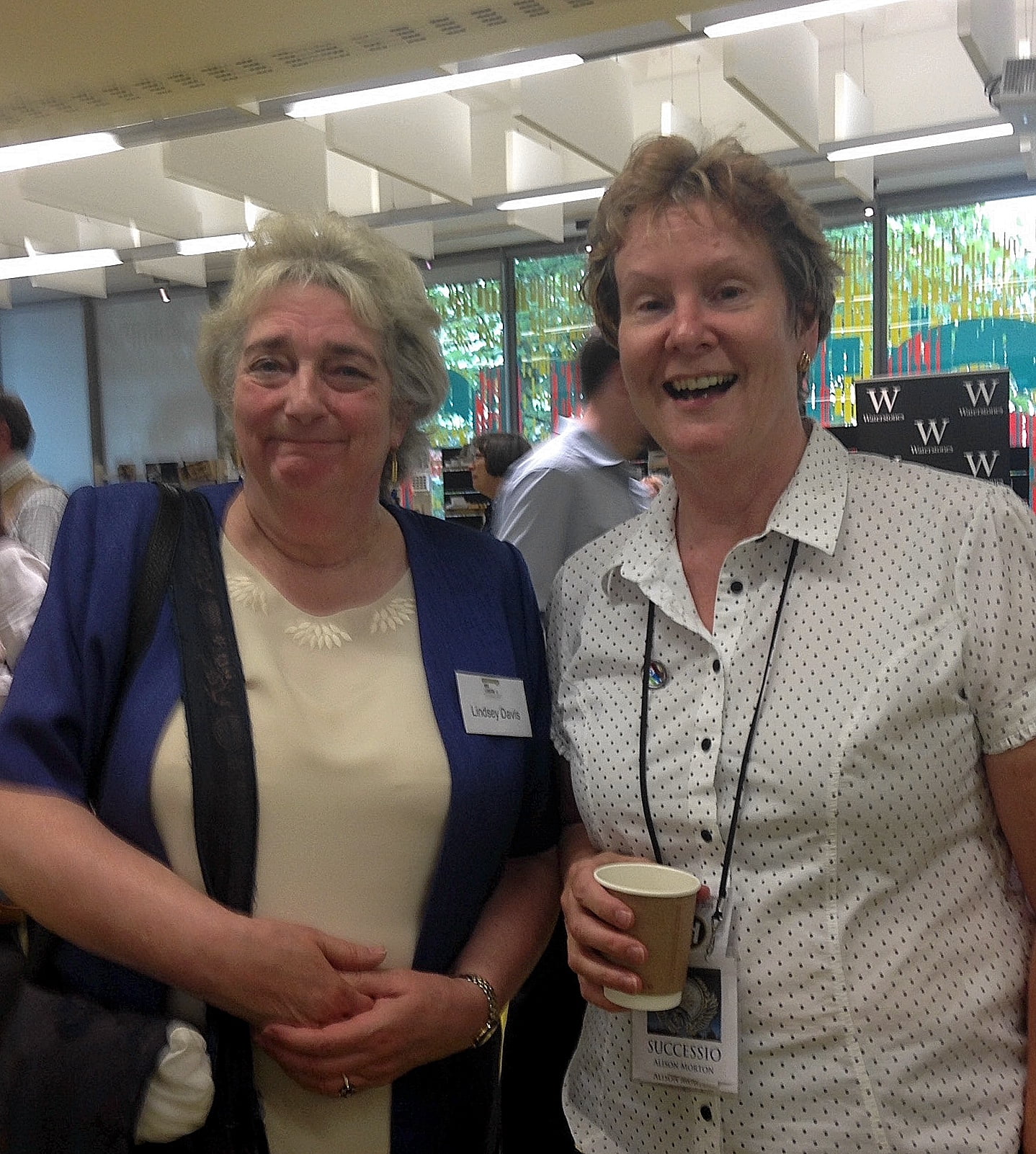

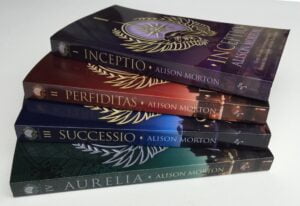
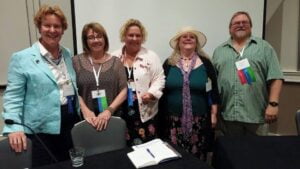
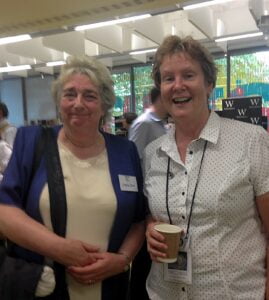



You should experience (though really you don’t want to) how some indie authors treat reviewers who don’t agree that their book is the best piece of fiction ever to be published. Common standards of manners and politeness out of the window…
Goodness me!
Firstly, I must apologise for not coming on the blog and answering you all. Apart from bashing away at the next book and life in general (as we all do), I never expected my little rant would garner so many terrific comments.
My hat off to you all for such lucid and insightful observations.
Secondly, I think most of you are not the entitled authors I was talking about. 😉
Thirdly, and please excuse me if it sounds big-headed, but I have worked hard to get to this point; 60 to 70 hour weeks are not uncommon in my life for the past five years and I’m supposed to be ‘retired’. Ha!
My plan always was to be an author. Full stop. It’s about the stories and the readers, not the ‘how’. I ran a business for nearly 20 years and like all small businesses, you have to do everything yourself and nobody gives you a paycheck. When I started writing novels I set out to learn about and interact with the publishing world. If my photos seem slightly triumphalist, they are not meant to be; they are to show what you can do with hard work and bloody-mindedness.
I’ll finish by saying that for any author courtesy, persistence and honesty go hand in had with realistic expectations. As Fiona remarked, good manners should be a given. It would make all our lives so much better.
[…] Opinion: Authors, Please Leave Your Sense of Entitlement at the Door […]
“I’m a moderately successful indie author with four books (so far) out in print and ebook which have been fortunate to have gathered some reader fans, lovely reviews and credible awards. ”
And I’ll bet Alison didn’t feel one bit “Entitled” to have the publishing world or readers buy her other three books because she had written her first novel!
Right!
And I have a bridge in Arizona I would like to sell Alison.
[…] To read the original post click here […]
What I have found in life is that everything is hard from going to school, corporate jobs, writing / publishing. I’ve never found anything easy or entitled. I wasn’t born with the right surname or a silver spoon in my mouth. We either create are own magic or we wither and die on the vine.
Well said Jon.
I have listened to others, re-wrote what was necessary and polished as best I can. I’m sure if I went back to college for 4 quarters that I could spend months re-writing my novels.
It doesn’t mean though that I would sell 1 additional copy.
Had I been born with the name Sam Elliott, lol, my western frontier eBooks would be making millions I hope.
Oh, my goodness. Allison! Well-said. I have moved off of some social media platforms because of indie authors shouting entitlement, i.e. expecting every reader to write a review…and complaining if not. One indie insisted the reader read her book on her computer. When I suggested that would tie up the reader’s workstation for hours…the author spewed vitriol. I am indie all the way and love it. I actually do not give a flying frog turd what booksellers or trad published authors think, say or do. I write my books, have them professionally edited, formatted, covered and proofed before I hit the publish button. We all miss the dropped article or typo. I repair any error within 24 hours, then promote and sell the things. My covenant is between my book and the reader. I am often asked what advice I would offer to indie authors. I say: Think for yourself. Learn the industry. Too few indies take the time to learn–and lack of knowledge causes dismay and missteps. Not to mention opportunities lost. Great post, but it won’t turn around the ego-centric author of any stripe. That is the sad part. Great good luck with your books.
Hi Jackie:
I think everyone is MISSING the point.
EVERY single author who has written his or her book as far back as there are printed books feel “Special and entitled”, printed authors perhaps even more so.
Don’t one of you tell me here that a published author can’t or doesn’t have poorly edited books on the market.
I am a member of Romance Writers of America and have browsed several hundred author websites and read excerpts, hoping to better my style of writing.
I was ashamed to find these so called “Professional published authors” to have far worse typo’s and grammar mistakes than I have had.
No one is perfect but from where I sit, there seems to be a hate for new authors. Maybe if every author was an English major their novels would be enjoyed more, maybe not.
You can’t please everyone or have a novel measure up to every readers expectations.
Wow….I had no idea such behavior was going on. You mean I’ve been slaving away at my laptops, (2) one for research…and one for writing only. I call her my virgin laptop…’cause she’s never been touched by the internet. Working on four different stories. Just completed one. Updating four different websites…checking my stats for visitors to my websites…and such. And now to hear…all I needed to do was have temper tantrums…and believe I was entitled. Wow…I had no idea we Indies were acting like that. Guess I’ve been glued to my laptops for too long and writing so much to prove myself. Doing proofreading and editing. I guess I need to get out more. I didn’t know this behavior was going on.
[…] Alison Morton British thriller writer Alison Morton, lets off steam about her frustration with indie authors with […]
Oo-er, Alison. You do sound cross! But I can’t help agreeing to the points in your excellent post. My main dread with a lot of indie authors is when they proudly say they’ve done a couple of drafts but don’t need an editor because English was their best subject at school, and therefore professional editing is a waste of money. No matter how I argue their misguided reasoning and tell them they won’t spot dozens of their own mistakes, they never believe me.
Occasionally, out of curiosity, I buy their book, and the errors and anachronisms and faulty timelines jump off the page. In the end I find I can’t continue, even though I can often tell they have a good story buried in there.
Why don’t these people who spend so many precious hours of their time writing the damned book take pride in their achievement and get it produced as beautifully as possible? I don’t really consider them professional writers. They’re just dabblers.
Glad I got that all off my chest!
Hi Denise:
“Why don’t these people who spend so many precious hours of their time writing the damned book take pride in their achievement and get it produced as beautifully as possible?”
This is a reasonable question, indeed.
The answer is quite simple.
Other that an author is conceited and thinks his book is “Perfect’, economics is the short and straightforward answer to your question.
The lowest quote I was given by a so-called manuscript editing service was $550.
And who is to say the person I have never met is even going to do a good job for the money I don’t have extra. $1,300 per manuscript was the high end.
This ‘COST’ may be just FINE for you or someone with a car and house paid for and a nice nest egg to rely on, but for many authors, we are NOT well-to-do financially.
This doesn’t excuse us from trying our best to make our manuscript the best it can be. It merely shows the reality that many of us face. It is not that we don’t care, it’s because we don’t have the money.
A manuscript service offered kindly to edit my eBooks for the low, low price of $33,000.
Do you really expect me to hand someone that much money and hope for the best?
Wonderful post. Nobody is entitled and all routes are hard. Those who imagine otherwise are a drag upon us all.
I know what you’re saying, Alison, and it’s interesting that so many people agree with you after you expected a back lash. For my part, I’m sick of the amateurs who think they can write one draft then publish it or think it’s ready for an editor. Honestly, even with all the good (and free) education on writing around, such ‘authors’ still exist (I’ve asked some how many drafts they wrote), and unfortunately some still foster the idea that conventions of grammar and so on simply aren’t important – it’s the creativity that’s important, they say! Add to that the fact that overwriting is a disease that’s rampant, yet often mistaken by readers and authors alike for ‘rich’ writing, and the prospect for written English to retain its elegance of expression isn’t good. A woman I spoke to recently said she found most indie books unreadable. She now checks out the publisher before buying.
Then when these authors strut around as if their book is the best thing to ever hit the shelves, they make it hard for everyone else, because those prejudiced against indies are delighted to find an example to prove their prejudice. Until we all act and write professionally that prejudice will remain because every poor example of an indie book gives it a reason for it to exist.
Unfortunately, however, even with the best of intentions people don’t know what they don’t know, and this can lead them to expect more from their book than it deserves. That’s why ‘real’ authors hire professionals to give them an independent assessment.
Hello Tahlia:
While much of what you say is true to an extent, for the poor author, (I am disabled on a very limited income), the editing websites I contacted to polish my manuscripts wanted $550- $1,300 per manuscript. The top end website wanted $33,000 to edit all 22 of my eBooks.
This simply is not possible.
I edit and grammar my eBooks, wait a month and come back and re-edit, in short, I do the best I can within my ability.
For those with a sack of cash and willing to spend it, a website editing person may be best since it is a business expense.
Just because someone is a new author doesn’t mean I or we are all strutting around.
If someone has written a novel, they have a right to feel proud of that accomplishment.
Not everyone who writes was a English major.
Hi Raymond and thanks for your comment. There are plenty of authors in the same boat as you in terms of financial constraints, and one very affordable tip I’d like to share with you is to use beta readers to read your work for you. Beta readers – test-pilots for unpublished books! – usually offer their services for free, and can be really helpful in spotting things you’ve missed, from grammar errors to inconsistencies in plotting to quirky things, e.g. for my first collection of short stories, one eagle-eyed reader noticed I’d mentioned recycling bins in three different stories – so I turned one of them into a bonfire instead, and it made a much better story, as well as preventing me from looking as if I was obsessive about recycling! For my current WIP, a collection of 15 short stories, another reader spotted three mentions of Victoria sponge cake, in three different stories. Replaced now with three kinds of cake! Some beta readers will read just for story, others for typos and grammar. They’re a great substitute for paid editing when you can’t run to the costs of a professional editor. You’ll find more on the blog about beta readers here https://selfpublishingadvice.org/better-your-books-with-beta-readers/ and here https://selfpublishingadvice.org/writing-how-to-find-beta-readers/ I’ve found my beta readers by asking writer friends on social media. Good luck with your books, Raymond, and best wishes.
Good Morning Debbie:
You are very kind.
Sound advice is always appreciated.
I did re-read 5,800 grueling pages of my books which took me two long months. With each book I finished editing, I clearly felt it was a better book. But when possible, a good author should leave nothing to chance.
Entitlement reminds me of how Stephen King’s first novel was rejected by publishers 75 times.
Did Stephen has this mindset?
“‘We demand a hearing.’, ‘It’s unfair.’, ‘Why don’t you stock my book?’, ‘Why aren’t I on the panel?’, ‘Why won’t you buy my book?, ‘I’m entitled to a chance.”
I don’t think he did.
I feel he knew he had a book destined for greatness.
But to reach the top of the mountain, a climber must strain, sweat, slip, fall, get scratched, bleed a bit. But once he has made it to the top, he truly has something to be proud of.
It is undisputed that publishers rarely take on an ‘unpublished author’ due to the expense. No one in a book store will know that author’s name let alone if he or she is a good or bad author.
A rejection letter can be a 1 page generic form or a brutal 4 page attack.
It is for this reason I do not pursue any publisher.
Case in point:
Award-winning thriller writer Robin Burcell was one of two women who sponsored the Lodi writers group at our local library years ago. The agent who read her San Francisco crime novel told her Miami crime novels were hot at the time. Robin re-wrote her novel several times until she was finally told by the agent that the novel wasn’t what was salable. Robin wasted a year of her life. She told us she cried and cried and then went out and got drunk.
One may feel that I am being stubborn, but I like my eBooks exactly as they are, the locale, age and names of the characters, what they do, the plot and the ending. One may say such stubbornness will not get me a book contract. So be it. A publisher who accepts me as a client knows I have been rejected by every other publisher. What incentive has he to offer me a fair advance and percentage of royalties? He knows I am desperate and grateful to finally get a publishing contract.
But back to Stephen king.
I can assure you that had Was It Fate Or Destiny? my first eBook been rejected 75 times, I would have never written the next 21 eBooks.
A writer must do and take the path they feel is best. Sometimes that path dead ends, or has a detour, a U-turn or a bridge out sign. Some writers have a tough ‘Turtle shell’ to do the publishing gauntlet. I know I don’t.
I think the biggest publisher gripe I have is this:
A publisher says, “I really like your book and I feel we could negotiate a contract… “IF” you would edit and polish several parts.”
Now for someone who has already polished their book the best they could, I feel if a publisher sees such ‘Success potential’ he should say,
“I feel we can negotiate a publishing contract if you will allow one of my editors to ‘polish your manuscript’ to make it more salable to readers.”
This option takes the strain off the writer, allows the publisher to be HAPPY the book is how he feels it can sell the most copies and it is a win-win situation.
But I know that is not how it works.
Does not being accepted by a publisher hurt me? Maybe financially but surely not emotionally.
I will continue to write and absolutely edit and grammar my books much better than I was able to in the past.
Wow- -deleted my comments and attacked me. All the best.
The same thoughts about attitude and entitlement can be said about EVERY author who is promoting their paperback book, not simply an eBook.
Alison, You make several very good points, all of which I agree. I too have invested in my product (at the different levels you mentioned) because the series should look professional to be taken seriously, and as more than someone who just wants to see her name in print, or on an e-book. After all, Indi authors have to risk more on our own with our reputations at stake to produce not only a nice looking product, but a quality read. I don’t have aspirations of fame and fortune, but if it should happen, wonderful. I just want to write the best possible series I can to interested readers of the fantasy/romance genre. They deserve at least that much for the minimal price of an e-book, or the paper version for a bit more.
I couldn’t help but wonder, though, why there are photos of you at conferences and a book store giving a talk and how it is related to an Indi author who might have a self-entitlement issue. Yes, this topic might spark some heat from someone who may feel entitled to more action from book stores for their book, and seeing a comment or two from the other side might help the overall perspective, but was this also intended as a bit of advertising too? Just a little curious.
I am replying to this post as the founder of a small group of philanthropists who established a monetary literary award ( to replace the lack of government support for debut writers). We provide two emerging writers, (no age limit ) per year, with the funds to secure the services of professional editors to do a substantive editing before the writer even considers publishing their work. We also freely mentor the writers through the various options of publishing, marketing and promotion because many do have the knowledge of how to approach a market. We do not dictate whether the writer should become an indie writer or try for the trade publishing avenue. What we do stress is ‘perfecting the craft of writing’ and never rush to publish – it can be a deadly marketing approach. Those of us who come from an accredited profession understand the value of ‘ putting in the 10,000 hours by doing the work’ while at all times remembering who values from the result – the client. In this case the reader. It is difficult to be a purist in todays commercial world however in my opinion, each writer needs to stay true to their words between the covers of the books they present to the reader by PERFECTING THEIR CRAFT and not grumble about how difficult it is to publish, market and promote their work. The real world of commercialism is very competitive and is not for those who presume their words are made of gold just because they wrote them. After all, they were the ones who chose to become career writers ( Hopefully not just because they know grammar and can string a line of words into a sentence but rather to educate OR entertain their followers – the readers.) I totally concur with Allison’s comments and endorse the work of ALLI by posting her thoughts, and bravo to all those writers who replied to this post-I personally look forward to reading your work.
Blessings from Canada
Merle, thank you for that supportive and thoughtful reply, and for the work of your philanthropic group – a little oasis in the midst of the cut-and-thrust of the publishing world. If you’d like to post a link to the group’s website here, please feel free to do so – I for one would love to know more about it, as commissioning editor of this blog, and always on the lookout for interesting stories!
Hello Debbie, Please get in touch via my personal email listed above so we can have future conversations – both about what you as a group do to support writers as well as our program. I am a retired architect who saw a need to support the arts without the encumbrances of government grants which lack empathy for the artist whether they are visual or literary. Our motto which we put into action is The Action of One on Behalf of Another in the Selfless Interests of Both. I will look forward to hearing from you, As aye, Merle
Excellent post – but I’d like to think we are all entitled to politeness (or, at the very least, we are entitled not to be dealt with rudely – I think there’s a subtle difference) from book-selling professionals. I don’t know of any indie authors who demand that anyone should stock/read their book. However, I do know of plenty who have been treated with an element of disdain (particularly by the larger book retailers, by reviewers, by the organisers of literary festivals) simply because they ARE indies. I can’t think of many retailers/litfest organisers who would treat paying customers the way some treat indie authors. And yet – AND YET – they aren’t shy about taking a 40% rake-off from us if they do deign to sell our work. There’s no such thing as a free lunch in this game, and I don’t honestly think many of us expect that. But good manners cost nothing, and I think that indie authors are entitled to that, along with the rest of humanity!
Excellent reply, Fiona. I couldn’t agree more.
Fiona, I’m afraid there are plenty of booksellers who have been on the receiving end of rudeness from local indie authors who are outraged when their books are turned down, because the authors have gone about it in the wrong way or have presented them with a book that is not saleable or not right for their particular shop. Less likely that ALLi members and readers of this blog will be like that because we are the ones who are taking the trouble to learn the right way of doing things and pride ourselves on our professionalism, but unfortunately there are plenty out there who don’t. More about that coming soon in ALLi’s new handbook, “How to Get Your Self-published Book into Bookstores”. (Our previous handbook “Opening Up to Indie Authors” covers litfests, libraries, etc.)
I agree with Jane on all counts! We do need to acknowledge the boldness of walking our own books through the gate, without permission from any acknowledged gatekeeper. it takes some brass, although the more work you put into learning your craft, writing a good book, and producing a well-crafted volume, the less brass is needed. And I agree that there are way too many people popping out a poorly written, badly produced book and demanding attention, like fifth-graders expecting an E for Effort for their little essay. The difference between the two types of indie works is obvious at a glance, so I think that will sort itself out in a few more years.
I would love to see a day when it’s the book, not the publisher, that is the basis of evaluation. But Alison, we’re not there, not by a long chalk. Indie books are segregated at HNS, for example, which has separate review venues for self-published books and other-published books. Why not treat them all like books? And at many conferences, still, indie authors can appear on panels about self-publishing, but not about writing or other reader-centric themes.
I don’t think I’m ‘entitled’ to such things just because I’m standing here with a book in my hands. I think my books are every bit as good as the ones on the other side of the gate. Let’s level the field and judge books on their merits.
Whilst I agree with everything you say, Alison, I find myself nodding my head at the comments Anna has made. I don’t believe ANY writer, trad or mainstream, is entitled to anything really. The reader is the one who will make the choices. But read what Anna has to say and surely you will see that level playing fields haven’t happened quite yet. Then, when the ground has been evened out (and I do think we have come ahead in leaps and bounds and are almost there), let the reader decide.
Anna, I couldn’t agree with you more about the segregation of books at the HNS! Although to be fair, it’s hard on the editors to expect them to wade through the pile of, well, less professional indies (not members of ALLi, I’m sure). I’d like to see a screening process for quality, as is done now, but with the “winners” being passed on to the general HNR reviewer list, to sink or swim as they will.
And yes, conference panels should mix in good indies, with the caveat that they not use the platform to plug their books. I say that because indies are naturally more forward about selling their brand, as they need to be, but a conference session isn’t the place.
I love this post, Alison. Yes, we all feel we’re ‘entitled’ when we start the learning curve. ‘I worked five years on this novel. I’m entitled to price it at $49.99 at Amazon!’ And good luck… We grow up when we realize we’re marketing a product whose value is solely in the minds of the customer. I paid $500 some years ago for a rare book on heirloom beans. (Yes, beans.) Nobody else would have given a cent for it. And I wouldn’t pay one cent to know the (true) size of Lady Gaga’s bar strap. But I suspect some folk would pay four figure sums.
We mature as authors when we accept that we are manufacturers. (As Dickens was.) All else is pretension.
BTW: We miss you at Writers’ Village!
Yes, dead right, Alison. In the main, we’ve got past the whole thing of trad authors looking down their noses at indies and indies literally begging everyone to buy their book – but not everyone has got the memo that these days it’s about choosing your preferred route – or routes – to publication and doing your damnedest to succeed. Plenty of people write books. More of those books are published than ever before, thanks to the indie revolution. But, even if you’ve done all that’s humanly possible to make it the best possible product, the world still doesn’t owe you any sales, regardless of how your work comes to market. It doesn’t work like that in any other industry, either.
Completely agree with you, Alison. One of the most persistent and important messages that I give out both in my how-to books for indie authors and in any talks I give at writers’ events is a big reality check that they are not entitled to anything, just because they’ve written a book. And in the meantime, with the other hand, I’m beavering away to build up a catalogue of fiction (my first love) and trying to earn my spurs with hard work and craft.
I love the way that you’ve drawn all authors together in your post, and applied the same rules, no matter how we are published. Roll on the day when it seems old hat to talk about how any of us were published, and just consider ourselves authors all on the same side.
The formula for lasting success in the book world is very much the same whether you’re a Big Five, small press or indie author: write really good books (which means working hard at all those writerly skills such as plotting, pacing, and generally stringing together excellent sentences), work extremely hard, network without being obnoxious, learn to market your brand and books, etc.–plus there’s a tiny element of sheer luck. And the whole process takes time and demands patience.
For all of us there’s an apprenticeship–for trade authors that comes in the form of the submission/rejection cycle, for indies there’s the equally harsh business of putting our early work in front of readers, knowing that by definition it’s not our best effort, and struggling financially as we put our money into quality books with little return at first.
You’re right that we need to acknowledge the boldness of declaring to the world that we, personally, find our work fit for the market. We need to acknowledge that this boldness looks like arrogance to writers who have spent the last ten years submitting books to publishers. And we need to acknowledge that the only way we can garner respect on the trade side is to write books as good as anything the industry puts out. Some indies are doing that already. And funnily enough, I’ve noticed that those indies who are the most entitled to attention and praise are NOT the ones whining about not being noticed. Because they did their apprenticeship and have learned some humility in the process, as well as learning that it’s about the books rather than them.
Thanks Alison – loved this. I get tired of all the stuff in my twitterfeed about how I have to promote this and monetize that (I read some, mute the rest). Just do the work – and yes, interact and stay informed, but mostly do the work.
Especially like the comment about not turning down a substantial offer from a big publisher… I’ve self-published my niche (non-fic) books because I design them and I like the control. The WIP, though, is far more complex than anything I’ve done yet and I’m not convinced I have the energy to Do It All and raise the money for printing through crowdfunding. So what was the backup plan – approaching a publisher – is moving up the list. We’ll see how it goes.
Thanks for sharing your thoughts!
Great post. As a formerly traditionally published author (2 non-fiction, 4 novels) gone Indie (15 novels), I find it unbelievable that some Indies are so unrealistic. Thousands of new books are published every week and it takes a lot of work to even get noticed.
Personally, I work away at my writing,trying to produce a new e-book every six months and try to build my e-mailing list through promotions and being active on Facebook, twitter and other social media. I’m very aware of the fact that my work is a mere drop in vast ocean of other books.
Excellent piece, and “spot on.” Whatever success I have had with Diving for Pearls has been a result of dogged persistence. And whatever failures I have met in regards to same has been result of not being persistent enough. Responsibility accepted.
Yes! Well done! This needed to be said and it will need to be said again. And again.